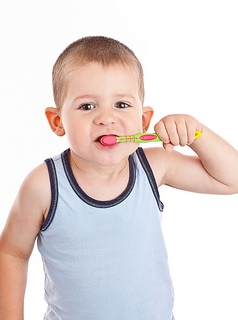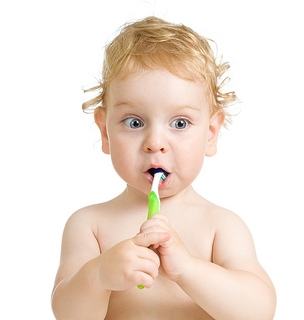
Our team at Dentistry 4 Kidz would like to offer some tips regarding the sometimes dreaded task of brushing a toddler’s teeth.
Much of the trick lies in the positioning. Before you begin, make sure you are in a position of control. This protects both you and your child from injury. Consider how well you can see. If you cannot see clearly, the quality of brushing drops significantly. For instance, if your child is standing, you are likely to see only the bottom teeth well.
Our team finds that the best position for brushing and flossing a toddler is when your child is calm. Have your child lie down on his or her back with arms out to make a T. Sit down just above the head and lightly place your legs over your child’s arms. Using a circular motion, brush all sides of the teeth.
It may sound odd, but approaching the routine this way can make brushing time a cinch! After you’re done, give your child the toothbrush and let him or her have a turn. The benefit of doing the brushing and flossing first is that it gives an example, which your child is more likely to repeat when you’re done.
Different methods work best for different families and children. These practices need to be performed with kindness and care. Be gentle and make this time a happy learning time. Don’t forget to bring your child to our Wichita Falls, TX office for regular dental checkups and cleanings. Dr. Iyer can advise you on ways to implement portions of these tips in a way that may work bests for you and your child.

Dr. Iyer and our team know it can be a challenge to get our children to brush, brush well, and brush often. Here are some tips that can help you keep those beautiful little teeth healthy.
Make it Fun, Make it a Habit!
We should all brush twice a day. The most important time to brush is at night before bed. When we sleep, our saliva production decreases, and this creates an environment for oral bacteria to cause greater destruction to our teeth and gums. Brushing should last at least two minutes, followed by flossing and mouthwash if you choose.
Here are some ideas to make this nightly ritual more entertaining.
As parents, we should help our children make health and wellness something to take pride in. Be gentle with your children when they make mistakes, whether forgetting to brush or maybe developing a cavity. Tell them even our team at Dentistry 4 Kidz gets cavities. Thankfully, there is always room for improvement. Happy brushing!

Let’s talk about the science of our teeth for a moment. Our enamel has a very high mineral content, making it extremely strong. In fact, enamel just happens to be the hardest substance in our bodies. But, unfortunately, it is not indestructible! Certain foods we eat can actually damage the surface of our teeth. Some simple and entertaining experiments can show children how our teeth can be affected by things we eat and drink, and how we can help protect them.
If you have a science-minded student at home, there are many activities you can do together, using educational websites, common household products and lots and lots of eggs. (Why eggs? Eggshells are a great substitute for teeth in these experiments. Not only are they various shades of white–like our own teeth, they are also calcium-rich—like our own teeth.) You can find any number of experiments using uncooked eggs, hardboiled eggs, whole shells with the contents blown out, or eggshells alone, so you can find just the right activity for whichever egg treatment works best for you.
Examine Enamel Erosion
One of the ways we protect our teeth is with healthy eating. The bacteria in plaque use the sugars and starches in our foods to produce acids. These acids are the substances that break down the minerals in our enamel and leave the enamel weaker. Weaker enamel is more easily attacked by bacteria and acids, which leads to cavities.
With eggs or eggshells and some carefully selected food products, you can see just how acidity affects teeth. Different websites suggest a variety of acidic liquids to dunk your eggs in, such as vinegar, soda, or citrus juices, so it’s easy to find an experiment that works with your pantry. Always use a plain water sample when you submerge eggs or shells to act as a control to measure differences against. How do the egg shells soaked in acidic liquids differ from those in plain water? It’s also fun to add simple sugar water as a test liquid to see what happens. Is it sugar or acid that causes more damage? And why might that be?
The Fluoride Fix
Fluoride is well known as a mineral that protects the structure of our teeth and helps prevent cavities. And there are actually experiments out there to test the protection fluoride provides using your egg stand-ins.
In some experiments, a hardboiled egg is coated with fluoride toothpaste or rinse for a specific amount of time and then dunked into vinegar. An untreated egg also gets a vinegar bath. You are asked to observe what is happening to each egg as it sits in its vinegar bath—are there bubbles on one egg and not the other? What do the bubbles mean? Other experiments require longer exposure to fluoride and then to vinegar—what happens to the shells of the treated and untreated eggs? What could this mean for our teeth?
Staining Studies
Our diet can do more than help create cavities. Enamel is very strong, but it is not stain-proof! Dark colored foods and drinks can make our teeth appear darker or more yellow. (And teeth that have suffered enamel erosion can pick up stains more easily.) How does food affect the brightness of our smiles?
If this question interests you, find experiments that use favorite beverages as a soak for your eggs. Choose liquids with a range of color, such as coffee, soda, and apple juice. Or choose an experiment that uses different varieties of soft drinks. Will foods the same color cause the same amount of discoloration in your egg volunteers? Do you want shorter or longer soaks in each liquid? Do you want to make use of a recycled toothbrush to see if brushing that discolored shell makes a difference? With toothpaste or without?
Even though these activities are designed for older children, they still require adult supervision. You can find detailed instructions for any of these experiments at many science and educational sites online. With some household supplies, plenty of extra cups, and a quantity of eggs, you and your child can demonstrate some of the basic effects our food choices have on the health and appearance of our teeth. It’s a wonderful way to promote healthy eating and brushing habits, scientific curiosity, and shared experiences!
Don’t forget to let Dr. Iyer know how your experiments turned out the next time you visit our Wichita Falls, TX office!

You have a lot more freedom as a teenager than you did as a young child. You also have a lot more responsibilities, and one of your jobs is to take care of your teeth. Develop and maintain good dental habits now so you can have great dental health for life!
Tooth Decay
As a teenager, you risk tooth decay, or dental cavities, if you are not careful. In fact, 59% of adolescents aged 12 to 19 have at least one cavity, according to the National Institute of Dental and Craniofacial Research. Dr. Iyer and our staff recommend keeping your teeth strong and healthy by brushing at least twice a day and flossing every day.
If you suspect that you have tooth decay, do not be embarrassed. Instead, ask your parents to bring you to Dentistry 4 Kidz to get it looked at. When you do not treat your dental cavities, they can turn into more serious problems. A severely damaged tooth may need to be treated with a root canal or even an extraction.
You can take easy steps to prevent tooth decay when you are at school or hanging out with your friends. Carry a bottle of water around with you so you can take a sip after you eat any kind of food. Choose water or milk instead of soda or sports drinks, and if you chew gum, select a sugar-free flavor.
Other Oral Health Concerns
You can probably think of many reasons why you should not smoke or use tobacco. Your oral health is another one. Tobacco gives you bad breath and stains your teeth yellow. It also increases your risk for gum disease and cancer of the mouth. Smoking even slows the speed of healing after you have dental procedures done.
Here are a few more tips that can keep your mouth attractive and healthy during your teen years.
You only get one set of permanent teeth in your life, so get in the habit of taking care of them now!